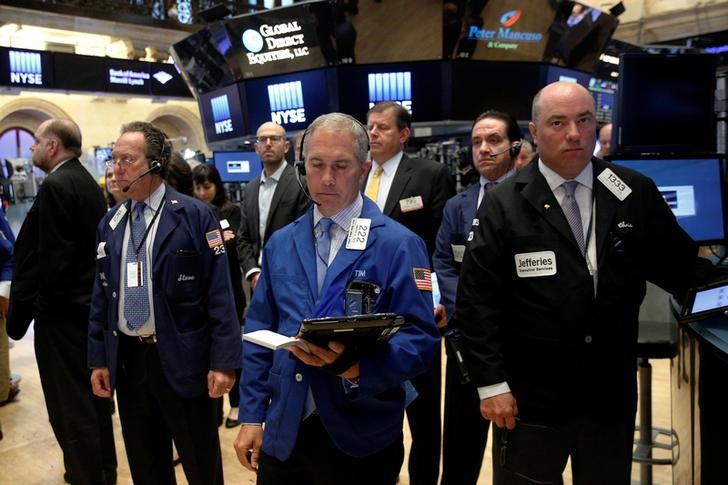By Herbert Lash
NEW YORK (Reuters) - Safe-haven German Bund yields fell below zero on Tuesday for the first time and global equity markets slid for a fourth day in a row on intensifying worries about a potential British exit from the European Union next week.
Polls and bookmakers' odds showed an increasing likelihood that Britons would vote to exit the European Union in the June 23 referendum. Britain's largest tabloid newspaper, the Sun, also said it was backing a "Leave" vote.
"The market is really afraid of the uncertainty of what the outcome will actually be," said Tony Bedikian, head of global markets at Citizens Bank in Boston, referring to Brexit.
The 10-year Bund yield fell as low as minus 0.032 percent, which effectively means investors are paying to lend money to the German government for a full decade.
U.S. Treasury yields fell to four-month lows on Brexit fears as investors pared lingering expectations the Federal Reserve would raise interest rates in coming months. A two-day meeting of the Federal Open Market Committee began on Tuesday.
Fed funds futures show investors see almost no chance of the Fed raising U.S. interest rates on Wednesday after the dismal U.S. payrolls report for May. Odds also have drifted towards zero as polls have shown the increasing likelihood of a Brexit.
Britain's departure from the EU would increase the risk to global growth, further weigh on the euro and strengthen the dollar, said Jeffrey Kleintop, chief global investment strategist at Charles Schwab (NYSE:SCHW) & Co Inc in Boston. That would tighten financial conditions and likely prompt the Fed to reconsider rate hikes, he added.
MSCI's all-country world stock index fell 1.2 percent while European shares fell for a fifth straight session. The pan-European FTSEurofirst 300 index closed down 1.89 percent at 1,260.14, a three-month low.
Investors on Wall Street launched a late-day rally but the major U.S. indices still ended with losses on Brexit fears. The CBOE Volatility index, or Wall Street's fear gauge, reached its highest in over three months and investors snapped up safe-haven assets like gold and the yen.
Over the past four sessions, the S&P 500 has lost 2 percent.
"We're trading on the Brexit polls," said John Canally, chief economic strategist for LPL Financial.
The Dow Jones industrial average fell 0.33 percent to end at 17,674.82 points. The S&P 500 lost 0.18 percent to 2,075.32 and the Nasdaq Composite declined 0.1 percent to 4,843.55.
Oil prices fell for a fourth straight day, swept lower by investor skittishness over Brexit. The referendum overshadowed signs of a return to health for crude markets after the International Energy Agency said the oil market is balanced after two years of surpluses.
Brent crude oil futures fell 52 cents to settle at $49.83 a barrel, while U.S. crude futures lost 39 cents to settle at $48.49 a barrel.
"Even as both OPEC and the International Energy Agency talk about a tighter oil market, fear of the fallout from a UK exit from the euro zone is throwing global markets into a tizzy," said Phil Flynn, an analyst at Price Futures Group in Chicago.
Volatility in the pound spiked to its highest in at least 20 years, rising beyond heights seen when U.S. investment bank Lehman Brothers collapsed in late 2008.
The dollar has risen about 1.5 percent from its June lows against a basket of currencies, spurred by Brexit fears. The yen surged to its strongest against the euro in more than three years.
The euro was down 0.87 percent against the yen at 118.94, while the dollar slid 0.1 percent to 106.12 yen.
The dollar trimmed losses against the yen slightly after a strong U.S. retail sales report for May, though the data did little to increase the odds of a Fed rate hike in the summer.

Gold hit its highest in almost six weeks. U.S. gold futures settled up 0.1 percent at $1,288.10 an ounce.